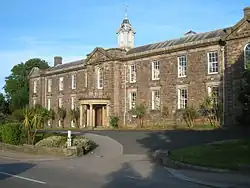| Old County Hall | |
|---|---|
 Old County Hall | |
| Location | Truro, Cornwall |
| Coordinates | 50°15′46″N 5°04′02″W / 50.2629°N 5.0672°W |
| Built | 1890 |
| Architect | Thomas Ball Silcock |
| Architectural style(s) | Neo-Georgian style |
Listed Building – Grade II | |
| Designated | 30 July 1993 |
| Reference no. | 1282633 |
 Location of Old County Hall in Cornwall | |
Old County Hall is a municipal facility at Station Road in Truro, Cornwall. The old County Hall, which was the headquarters of Cornwall County Council from 1890 to 1966, is a Grade II listed building.[1]
History
In the 19th century the Shire Hall in Bodmin was well established as the venue for dispensing justice in the county.[2] However, following the implementation of the Local Government Act 1888, which established county councils in every county, it became necessary to find a meeting place for Cornwall County Council.[3] County leaders decided to procure a purpose-built county hall: the site they selected was occupied by open fields just to the west of Truro railway station.[4]
The new building, which was designed by Thomas Ball Silcock in the Neo-Georgian style, was completed in 1890.[1] The design involved a symmetrical main frontage with eleven bays facing onto Station Road with the end bays slightly projected forwards; the central section, which also slightly projected forward, featured a bow-shaped porch with Tuscan order columns; there was a round headed window on the first floor and a pediment above; there was a cupola with a weather vane at roof level.[1] Internally, the principal room was the council chamber which was at the centre of the building.[1] The building, which became increasing blackened with soot from the local factory chimneys, was extended in 1925 and again in 1939.[5]
After the county council moved to New County Hall at Treyew Road in July 1966, the Old County Hall site continued to be used by the Cornwall Record Office.[6] The Board of Inquiry into the loss of the pleasure cruiser MV Darlwyne, which resulted in the deaths of thirty-one people (two crew and twenty-nine passengers including eight children), was held in the Old County Hall in December 1966.[7] The position of Truro as the county town was consolidated during the late 1960s when, following the closure of Bodmin General railway station in 1967, the crown court moved to Truro as well.[8]
The building was acquired by a developer, Nigel Carpenter, in July 2012 and much of the building was subsequently converted for residential use.[9][10][11] Although the proposals included a hotel and a spa, those aspects of the proposal did not progress.[12] The Cornwall Record Office moved to Kresen Kernow in September 2019.[13][14]
References
- 1 2 3 4 Historic England. "Old County Hall, Truro (1282633)". National Heritage List for England. Retrieved 21 September 2019.
- ↑ "Take a step back in time at The Shire Hall". BBC. 28 October 2014. Retrieved 14 November 2020.
- ↑ "Local Government Act 1888". Legislation.gov.uk. Retrieved 17 August 2019.
- ↑ "Ordnance Survey Map". 1880. Retrieved 17 August 2019.
- ↑ "Truro's secrets revealed but only if you look up". Cornwall Live. 11 October 2020. Retrieved 14 November 2020.
- ↑ "Archives and Cornish Studies Service move to Kresen Kernow". Cornwall Council. Retrieved 17 August 2019.
- ↑ Lyon, Nick (2019). The Forgotten Shipwreck: Solving the Mystery of the Darlwyne. Dived Up Publications. p. 79. ISBN 978-1909455313.
- ↑ "The proud and fascinating history of Cornwall's 'county towns' Bodmin and Launceston". Cornwall Live. 4 July 2020. Retrieved 14 November 2020.
- ↑ "Homes are for sale at The Old County Hall in Truro with a hotel and spa also in the works". Cornwall Live. 8 October 2017. Retrieved 17 August 2019.
- ↑ "Debating chamber restaurant to feature in former Cornwall Council HQ hotel". Big Hospitality. 15 July 2012. Retrieved 21 September 2019.
- ↑ "Old County Hall". Truro Trail Magazine. p. 5. Retrieved 27 October 2020.
- ↑ "Old County Hall, Truro". Cornish Stuff. 6 January 2020. Retrieved 14 November 2020.
- ↑ "Kresen Kernow - Cornwall's new archive centre". Cornwall Council. 15 November 2016. Archived from the original on 22 October 2020. Retrieved 14 November 2020.
- ↑ "First look inside the new centre which will save Cornwall's history for generations". Cornwall Live. 4 August 2019. Retrieved 14 November 2020.